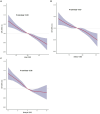Association of the oxidative balance score with sarcopenia among young and middle-aged adults: findings from NHANES 2011-2018
- PMID: 38895657
- PMCID: PMC11183506
- DOI: 10.3389/fnut.2024.1397429
Association of the oxidative balance score with sarcopenia among young and middle-aged adults: findings from NHANES 2011-2018
Abstract
Background: Sarcopenia is associated with oxidative stress. The Oxidative Balance Score (OBS) is commonly used to assess dietary and lifestyle exposure to oxidative stress. However, few studies in the literature have assessed the correlation between sarcopenia and OBS.
Aim: This study aimed to assess the association between OBS and sarcopenia among young and middle-aged adults in the United States using data from the National Health and Nutrition Examination Survey (NHANES).
Method: Weighted logistic regression analysis was used to investigate the association between OBS and sarcopenia based on data from NHANES 2011-2018. Subgroup analyses were performed to observe the consistency of the outcomes, and the stability of the results was tested using sensitivity analyses.
Result: The final sample included 5,525 young and middle-aged American adults. A higher OBS was associated with a lower risk of sarcopenia. In the fully adjusted model, the second (odds ratio [OR]: 0.62, 95% confidence interval [CI]: 0.41, 0.94; p = 0.023), third (OR: 0.50; 95% CI: 0.34, 0.74; p < 0.001), and highest quartiles (OR: 0.18; 95% CI: 0.11, 0.28; p < 0.001) of the OBS were associated with higher risks of sarcopenia when compared to the lowest quartile. This association was consistent across both dietary and lifestyle OBS scores. Our subgroup analysis revealed no significant differences between the subgroups of variables included in the interaction analysis. Sensitivity analyses revealed similar results.
Conclusion: Our study showed that higher antioxidant and lower antioxidant exposure may decrease the risk of developing sarcopenia. Higher OBS scores may indicate greater protection against sarcopenia; however, further clinical studies are warranted to confirm these findings.
Keywords: NHANES; lifestyle; nutrition; oxidative balance score; sarcopenia.
Copyright © 2024 Cai and Dong.
Conflict of interest statement
The authors declare that the research was conducted in the absence of any commercial or financial relationships that could be construed as a potential conflict of interest.
Figures



Similar articles
-
Oxidative balance score is associated with increased risk of sarcopenia and sarcopenic obesity in non-elderly adults: results from NHANES 2011-2018.Nutr Metab (Lond). 2025 Mar 11;22(1):23. doi: 10.1186/s12986-025-00914-3. Nutr Metab (Lond). 2025. PMID: 40069772 Free PMC article.
-
Gender-specific association of oxidative balance score with sarcopenia in American adults: NHANES 2011-2018.Exp Gerontol. 2025 Jul;206:112775. doi: 10.1016/j.exger.2025.112775. Epub 2025 May 7. Exp Gerontol. 2025. PMID: 40339764
-
Association between suicidal ideation and oxidative balance score (OBS): National Health and Nutrition Examination Survey (NHANES) 2005-2018.J Affect Disord. 2025 Feb 1;370:328-336. doi: 10.1016/j.jad.2024.11.010. Epub 2024 Nov 5. J Affect Disord. 2025. PMID: 39505022
-
Associations of oxidative balance score with total abdominal fat mass and visceral adipose tissue mass percentages among young and middle-aged adults: findings from NHANES 2011-2018.Front Nutr. 2023 Dec 5;10:1306428. doi: 10.3389/fnut.2023.1306428. eCollection 2023. Front Nutr. 2023. PMID: 38115885 Free PMC article.
-
L-shaped association between oxidative balance score and vision-related functional burden in adults in the United States, NHANES 2005-2008.Front Nutr. 2025 May 2;12:1507889. doi: 10.3389/fnut.2025.1507889. eCollection 2025. Front Nutr. 2025. PMID: 40386211 Free PMC article.
Cited by
-
Association of the cardiometabolic index with sarcopenia among U.S. adults: NHANES 2011-2018 findings.PLoS One. 2025 May 15;20(5):e0323905. doi: 10.1371/journal.pone.0323905. eCollection 2025. PLoS One. 2025. PMID: 40373017 Free PMC article.
-
The association between oxidative balance score and muscular dystrophies.Front Nutr. 2024 Sep 13;11:1465486. doi: 10.3389/fnut.2024.1465486. eCollection 2024. Front Nutr. 2024. PMID: 39346651 Free PMC article.
-
Oxidative balance score predicts chronic kidney disease risk in overweight adults: a NHANES-based machine learning study.Front Nutr. 2025 Jul 16;12:1641496. doi: 10.3389/fnut.2025.1641496. eCollection 2025. Front Nutr. 2025. PMID: 40740644 Free PMC article.
-
Investigating the relationship between body roundness index and low muscle mass based on a cross-sectional study: Focus on visceral adipose tissue.PLoS One. 2025 Aug 19;20(8):e0326441. doi: 10.1371/journal.pone.0326441. eCollection 2025. PLoS One. 2025. PMID: 40828794 Free PMC article.
-
Melatonin protects against sarcopenia in middle-aged mice.Histol Histopathol. 2025 May;40(5):745-755. doi: 10.14670/HH-18-814. Epub 2024 Sep 13. Histol Histopathol. 2025. PMID: 39385610
References
LinkOut - more resources
Full Text Sources

